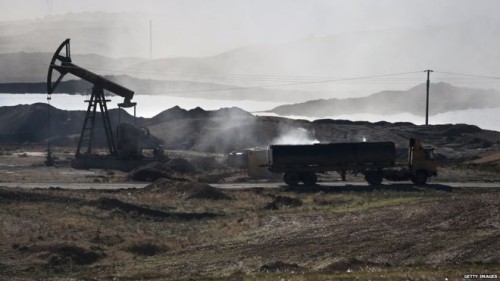PHOTO: An oil pump in northeast Syria
On Monday, US officials proclaimed a victory over the Islamic State in eastern Syria, saying that 116 trucks carrying oil produced by the militants had been destroyed in the airstrikes.
The officials declared that the attacks would dent ISIS revenues and had overcome fears that the airstrikes would cause civilian casualties. Media such as The New York Times reported the upbeat statement, without any questions or reference to local sources: “The new campaign is called Tidal Wave II. It is named after the World War II effort to counter Nazi Germany by striking Romania’s oil industry.”
See Syria Daily, Nov 16: US — We Hit 116 Islamic State Oil Trucks
That portrayal is in contrast to reports from activists in northeastern Syria, who are expressing concern about the effect on civilians of the disruption of oil supplies.
The sources note that it is not only civilians in ISIS-held areas who may suffer shortages. The Assad regime has purchased oil from the Islamic State, who control most of Syria’s fields, and rebels trade food and other supplies for fuel.
One opposition source summarizes:
Only rebel brigades have fuel reserves. During the recent fuel crisis [in northern Syria], they have supplied hospitals and other important facilities with fuel, while pressing Daesh [the Islamic State] to stop the blockade of fuel to liberated areas.
When the US coalition destroys the tanker trucks which supply the north, there is no leverage [with ISIS]. Turkey forbids fuel exports, so the civilians will suffer. Rebels cannot give them diesel for their generators any more.
The sources predict that this winter’s crisis will be “way worse” than cut-offs this summer. They say that, even if Turkey allows supplies to northern Syria, there is no infrastructure for transport: “NGOs do not have fuel tankers, and the few that currently get the fuel from the east will be destroyed by the US.”

